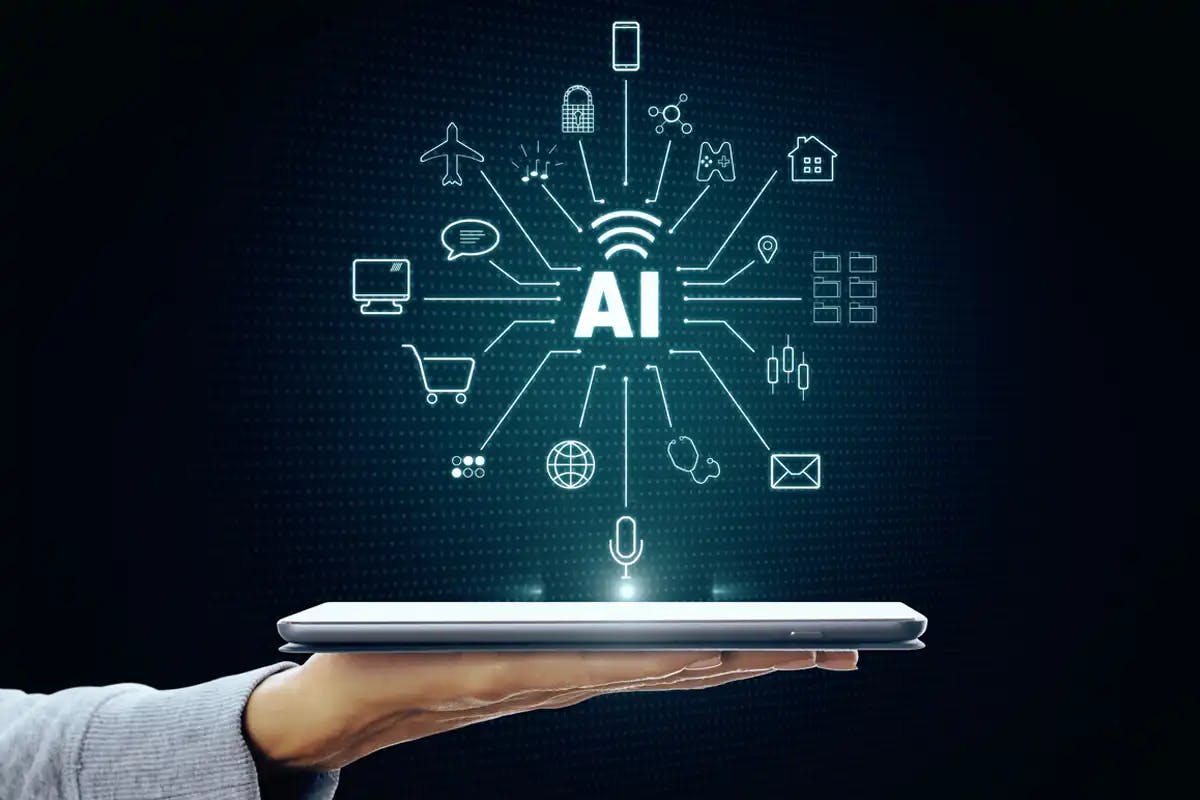
,
The marketing world has experienced significant changes with the rise of generative artificial intelligence. Generative AI in the marketing industry shows great promise in transforming promotional efforts by revealing unprecedented inventiveness, mechanisation, and insights gleaned from data. This emerging development can change customary methods through advancing novel concepts, reducing manual endeavors, and offering intelligence derived from inputs. In fact, as per the latest report of statista.com, it is expected that the market size of generative AI in marketing is to reach $22 billion, which was $1.9 billion in 2022.
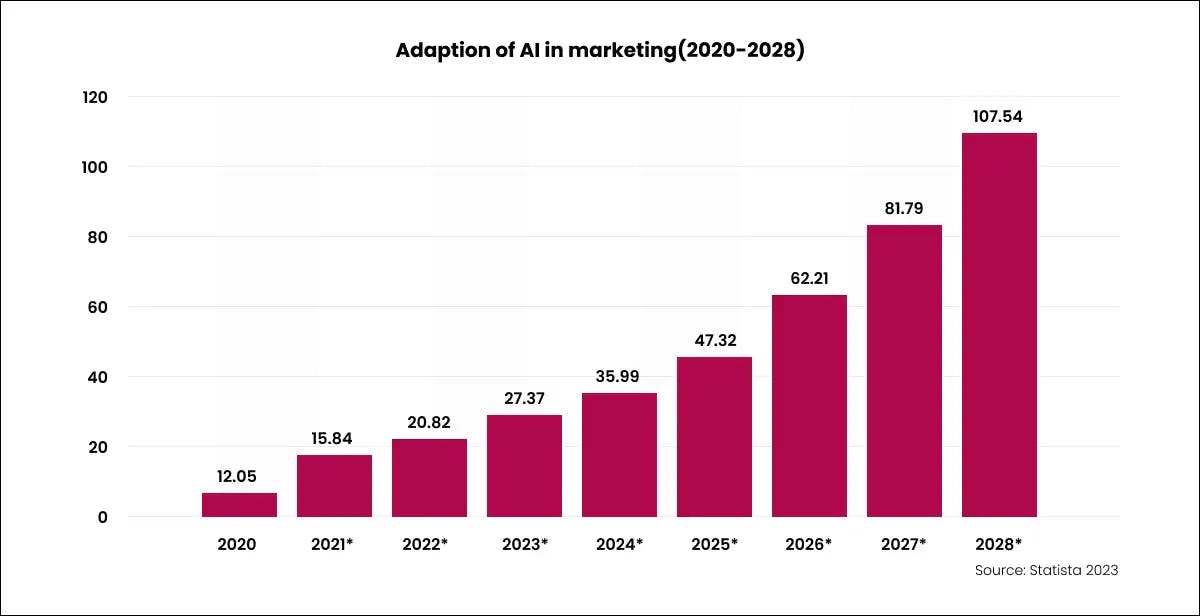
When discussing generative AI and marketing, one must consider generative models. Generative AI involves machine learning systems that can produce entirely novel and original creations such as images, videos, writings, and other media. Through analysing data and discerning patterns, generative AI is able to autonomously craft customised outputs tailored to define objectives. Unlike analytical AI focused solely on examination and advice, generative varieties can synthesise information to generate new content.
This blog sheds light on how generative AI will reshape marketing. We will explore the inner mechanisms of generative AI in marketing, its varied applications, and plans for incorporation, advantages, and boundaries. Grasping generative AI is essential to remaining ahead of the curve and prospering in the age of artificial intelligence.
Top Use Cases of Generative AI in Marketing
Generative AI refers to machine learning models that can produce new, original, and realistic data or content. Unlike traditional AI focused on analysis, generative AI can autonomously create images, videos, speech, text, and other media formats from scratch.
Generative adversarial networks (GANs) are the most popular techniques powering modern generative AI systems. GANs utilise a generator model that creates new samples and a discriminator model that distinguishes generated data from real data. These two models compete against each other during training until the generated samples are highly realistic and indistinguishable from actual data.
The uses for artificial intelligence in creative fields and marketing continue growing quickly. Marketers can now enhance many aspects of their strategies and processes using this technology related to generative AI for marketing. We will explore the primary manner in which intelligent content generation is transforming marketing efforts.
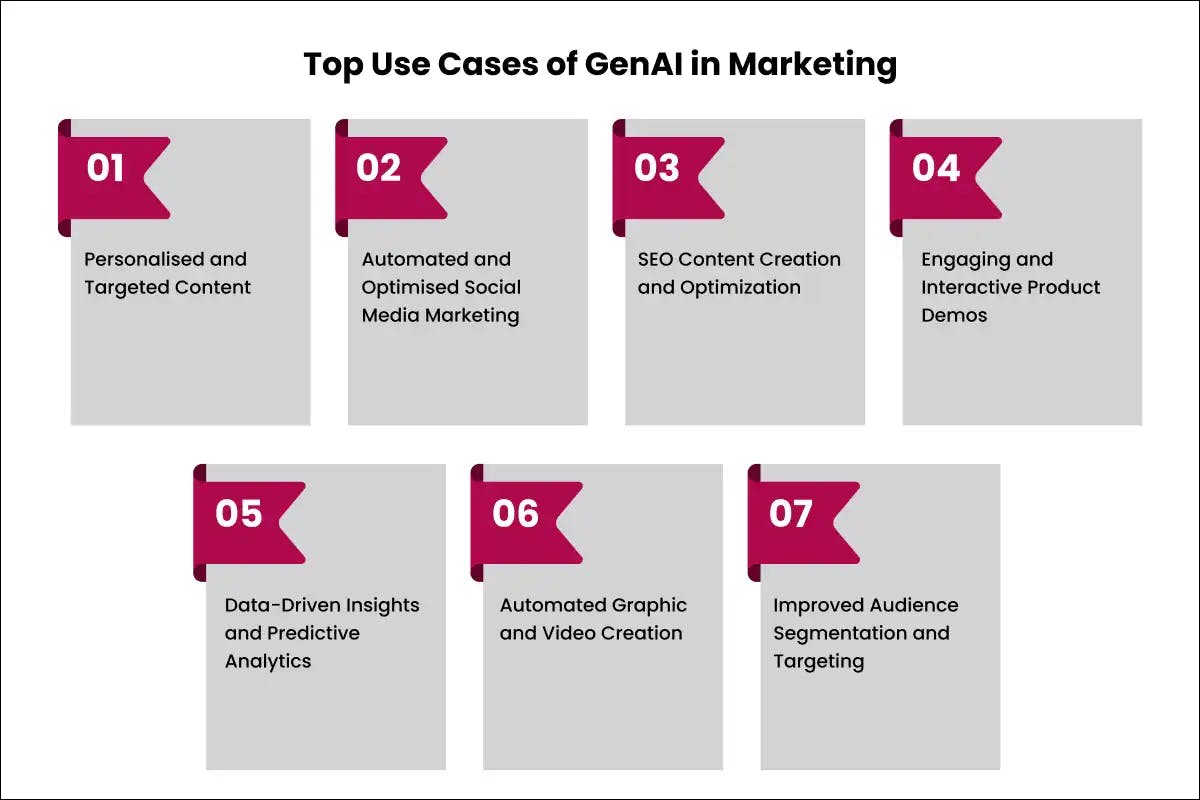
1. Personalised and Targeted Content
Generating custom content tailored to individual users is one of the most powerful applications of generative AI in marketing examples. Armed with user data and preferences, generative AI systems can produce personalised product recommendations, targeted ads, custom landing pages, individualised email content, and more.
For instance, generative algorithms can analyse customer demographics, interests, and browsing history to create customised product recommendations for email newsletters or website displays. Content with the right tone, messaging, visuals, and calls-to-action resonates better with audiences, improving engagement and conversions.
Similarly, generative AI can optimise advertisements for specific users by assessing their preferences to select relevant visuals, text, and placement. Tailored ads performed better than generic ads by 60% in a recent Orbit Media Studios experiment with generative AI. The technology future-proofs marketing against disruptive technologies like ad-blockers.
Let us now find out 2 tools that can help you with this:
- Persado:
This AI writing platform generates emotionally intelligent marketing copy tailored to specific audiences. It analyses data like demographics, psychographics, and past behaviours to create persuasive messaging for each customer segment. - Wibbitz:
This video creation tool uses AI to turn text into dynamic video content. It can take a brand's messaging and automatically generate customised explainer videos based on the target audience's preferences. The visuals, tone, and pacing are adapted for each target group.
2. Automated and Optimised Social Media Marketing
Social media marketing involves high volumes of content creation and analysis. Generative AI streamlines workflows by producing posts, ads, and captions tailored to each platform's style and target audience.
AI tools can curate and process user-generated content to determine high-performing post types, themes, and engagement strategies for a brand. These insights inform content guidelines and strategies to optimise organic reach and paid promotions.
In a test by Phrase, a generative AI platform generated Facebook ad language that outperformed humans by 2.5x for click-through rate (CTR) and conversions. Automating data-driven content creation bolsters marketing success on social platforms and proves to be one of the best generative AI marketing use cases.
Let us now find out tools which can help you with this:
- Coverage:
This platform uses AI to generate high-performing social media post ideas, images, captions, and hashtags tailored to brands' target audiences and goals. It analyses past performance data to optimise future content. - Socialtyze:
This tool creates AI-generated social media content including posts, stories, and ads that are customised for each platform. It A/B tests content variations to determine optimal messaging and creative for improved engagement.
3. SEO Content Creation and Optimization
Generating blogs, articles, website copy, and other content with the right keywords and optimization for search engines is critical for SEO and organic growth. However, manual optimization is resource intensive.
Utilising data on search trends, competition analysis, and target queries, generative AI can create SEO-friendly content tailored to topics that generate traffic. This data-driven approach also supports long-term SEO strategies such as link building, by creating authoritative content that other sites are more likely to reference. The AI assistant Wordsmith tripled visitor traffic for Forbes by auto-generating content based on trending user searches. Generative copy allows scaling content production while retaining quality and search optimization.
Let us now find out tools that can help you with this:
- Copy.ai:
This AI writing assistant creates SEO-optimised content like blog posts, web pages, and news articles tailored to target keywords and search intent. It analyses search data to inform content themes and structures. - INK Amplify:
This tool auto-generates blog posts and long-form content infused with target keywords. It optimises pages for voice search and analyses search performance to refine content over time.
4. Engaging and Interactive Product Demos
Showcasing products through interactive demos and virtual try-ons enhances customer experience and engagement. While producing such experiences manually requires extensive effort, generative AI can automate the process.
Brands like Dulux and L'Oréal employ generative AI to allow virtual painting and makeover experiences. Users can visualise products realistically through personalised demos. Generative product visualisation and customization cultivate more engaging brand interactions and prove to be one of the great generative AI in marketing examples nowadays.
Let us now find out tools that can help you with this:
- Genie:
This platform generates customised 3D product configurators and virtual try-on experiences tailored to each user. Shoppers can visualise products in different scenarios through AI-powered simulations. - Mursion:
This tool uses conversational AI and simulations to create interactive product demos with personalised recommendations and guidance. The lifelike virtual selling experiences promote higher engagement.
5. Data-Driven Insights and Predictive Analytics
Creating precise predictions and forecasts can heighten the impact of marketing efforts. Advanced algorithms can swiftly analyse large amounts of information on previous results, patterns, timing fluctuations, and outside influences to deliver valuable conclusions. By examining details ranging from what attracted interest in the past and what topics saw growing discussion at certain times of year, the algorithms provide me a measurable analysis of the trend. Through this examination of how numerous interconnected facets interplayed previously, projections take shape about what messaging and scheduling strategies may gain the most popularity in the future.
Companies have begun utilising predictive analytics to project campaign spending plans and returns on investments. Models now foresee website visits, potential customers, and earnings by examining connections in past information. These information-powered understanding permits enhancing techniques and allotments for amplified ROI.
For example, Doodle Brands tapped generative AI to predict revenue and set accurate monthly budgets. Accurate forecasting reduced their traffic acquisition costs by 22% in a year through optimised bids and budgets.
Let us now find out tools which can help you with this:
- Funnel.io:
This platform analyses past campaigns and customer data to forecast future performance. - Impact Analytics:
This tool examines multiple data sources like ads, website analytics, sales, etc. to surface insights.
6. Automated Graphic and Video Creation
Design assets like images, videos, and graphics are essential for marketing campaigns across channels. However, sourcing quality visuals and producing custom designs requires substantial time and resources.
Generative design tools allow the creation of completely new, unique images and videos in any desired style. Rather than choosing between generic stock visuals or expensive custom productions, marketers can generate endless tailored designs.
Platforms like Adobe Express, Canva, and Bannerbear use generative AI to create logos, social posts, ads, brochures, and other graphics within minutes. Automated visual creation streamlines asset production for campaigns.
Let us now find out tools that can help you with this:
- Runway:
This platform generates custom images, logos, and designs by simply entering a text description. It leverages AI to transform concepts into visuals in any brand style. - D-ID:
This tool creates AI-generated videos using just a script. It produces high-quality custom videos with dynamically generated visuals, voices, and music tailored to the storyboard.
7. Improved Audience Segmentation and Targeting
Pinpointing and engaging the right audiences is critical for effective marketing. By analysing CRM data, media habits, survey responses, and other audience inputs, generative algorithms can identify and profile consumer micro-segments with precision.
Granular psychographic and behavioural segmentation enabled by generative AI marketing allows targeting specific niches cost-effectively. Brands can personalise messaging and experiences for niches that are likely to convert based on their interests and attributes. Refined targeting expands reach and conversion rates.
For instance, Allegro, an eCommerce platform, utilised generative AI to segment users into over 500 sub-groups based on transaction history and activity. Targeting products to each group increased sales by 12-18% across various categories.
Let us now find out tools which can help you with this:
- Affinity:
This platform analyses customer data to identify highly-specific audience segments and their preferences. Its AI models profile subgroups for precise targeting across channels. - Albert:
This tool leverages machine learning to segment audiences and map customer journeys based on behaviours. It identifies high-value niches to optimise targeting and personalization.
Strategies for Implementation of Generative AI in Marketing
Implementing generative AI for marketing requires robust data pipelines, purpose-built models, and integration with workflows. Here are some tips for effective implementation of generative AI for marketing:
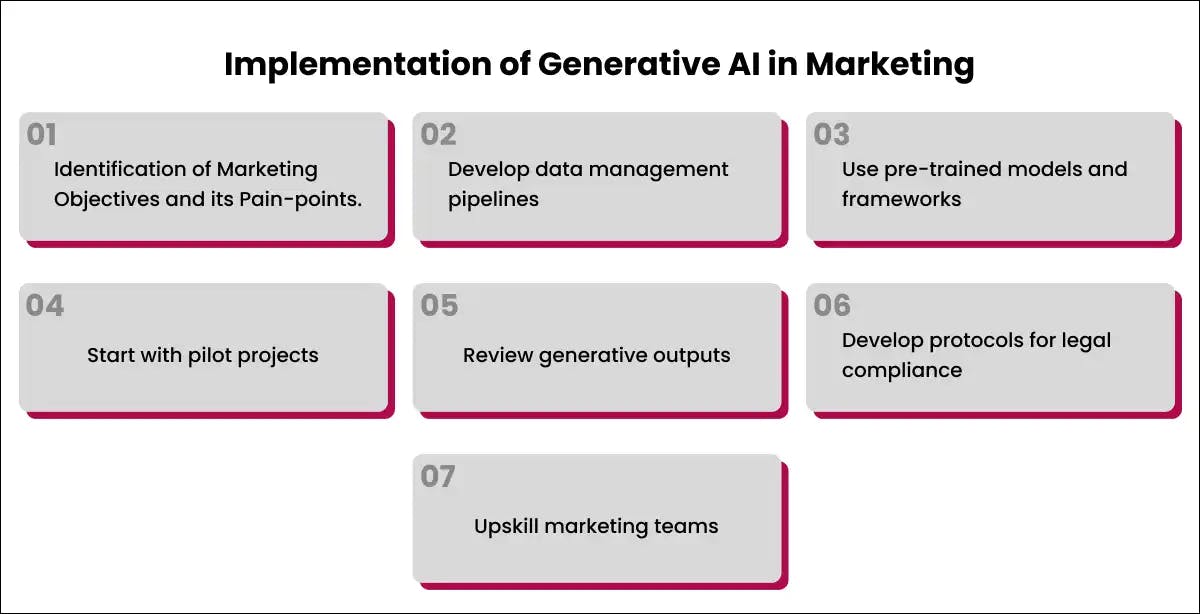
- Assess marketing objectives, pain points, and use cases to identify the appropriate applications for generative AI. Prioritise automation for repetitive and data-heavy tasks.
- Build reliable data management pipelines from CRM, web analytics, social media APIs, and other sources to train AI models. Ensure legal compliance and data governance.
- Use pre-trained models and frameworks like DALL-E and GPT-3 through API access for quick implementation. Invest in custom models for proprietary data.
- Start with pilot projects in low-risk areas to test capabilities, build credibility, and optimise workflows. Gradual rollout allows smoothing adoption.
- Review generative outputs to check relevance, accuracy, grammar, and brand alignment periodically. Refine datasets and models iteratively.
- Develop protocols for legal compliance, ethics, and anti-bias measures in generated content. Monitor for problematic patterns continuously.
- Upskill marketing teams to utilise generative tools through training in AI applications, data skills, and creative oversight. Ensure transparency in AI usage before using generative AI for marketing.
With strategic implementation accounting for data, model development, and skill building, generative AI can transform marketing efficiently.
Benefits of Generative AI for Marketers
Here are some key advantages generative AI confers to marketers:
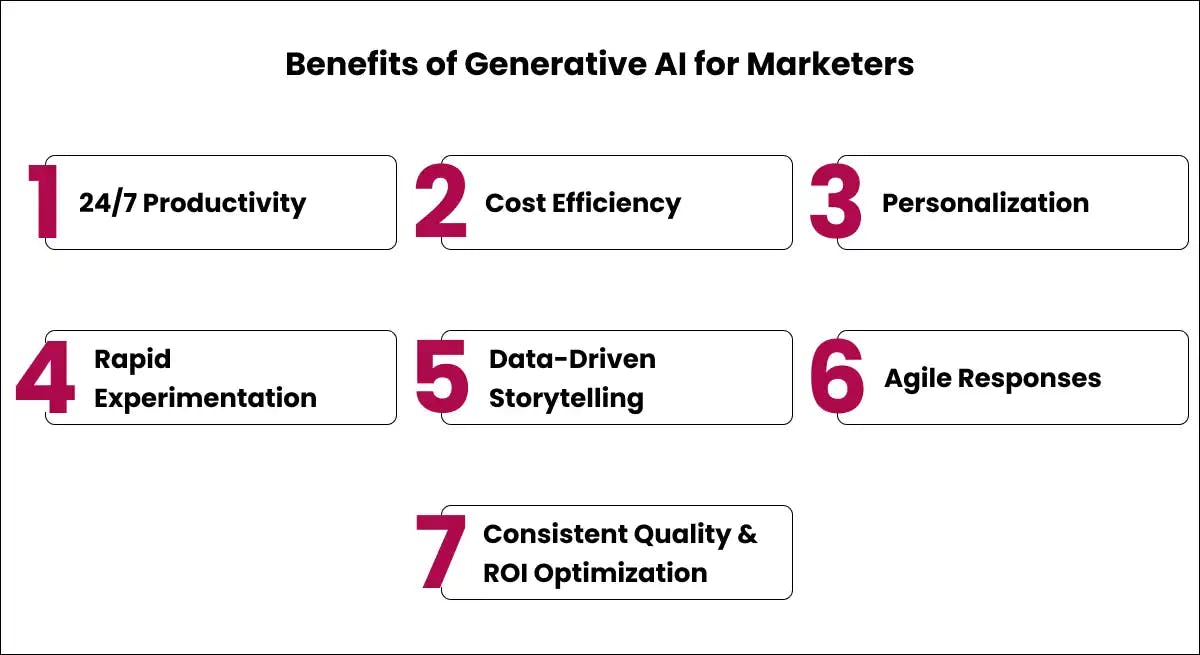
- 24/7 productivity and output through automated content creation at scale
- Reduced costs and resources needed for labour-intensive tasks like design, writing, and analytics
- Improved personalization and segmentation for highly targeted campaigns
- Faster experimentation by rapidly generating and testing multiple variations of content
- More impactful storytelling through data-driven audience insights
- Agile responses to market changes thanks to predictive modelling
- Consistent high-quality output and optimization for ROI goals
By augmenting human creativity with machine capabilities, generative AI can provide significant productivity gains. Marketers can divert time and effort from repetitive tasks towards high-value strategic initiatives by utilising generative AI use cases in marketing.
Risks and Limitations of Generative AI
Despite the immense potential of generative AI for marketing, some limitations and risks of generative AI include
- High development costs for custom enterprise-grade models of generative AI and marketing.
- Poor quality or logically inconsistent content if the generative AI model lacks sufficient or unbiased data
- Data privacy concerns regarding personal or proprietary data usage
- Legal risks around copyright, ownership of generated content
- Ethical issues like perpetuating harmful biases or spreading misinformation
- Security vulnerabilities from exposing APIs and data access to external vendors
Maintaining responsible oversight, evaluating output, and continuously enhancing the models are key to mitigating these challenges related to generative AI in marketing examples. Marketers should be cautious in adopting generative AI without rigorous testing and risk analysis.
The Future of Generative AI in Marketing
While still in its early stages, generative AI is primed to drive exponential change across marketing. According to Gartner, by 2025, generative AI will account for 10% of all data produced, enhancing productivity and data value in terms of generative AI for marketing.
- The Possibilities and Impact of Mainstream Adoption
As generative AI becomes more advanced and accessible, mainstream integration across marketing is set to follow. According to research firm Gartner, 20% of enterprises will be using some form of generative AI by 2025. - Hyper-Personalized Experiences
Earlier, generative AI allowed the creation of targeted ads and recommendations for segments. With the mainstream integration of virtual assistants and chatbots, hyper-personalised conversations and experiences tailored to each customer will become possible. - Immersive Product Engagement
Advances in simulation and visualisation can enable interactive 3D product experiences using virtual or augmented reality. Rather than static images, consumers can engage directly with photorealistic 3D product environments generated just for them. - Predictive Content Performance
Tools like Anthropic's Claude can already estimate the click-through and conversion rates for marketing emails. As predictive abilities improve, generative AI may forecast performance metrics for content based on past data before launch. - Automated Multichannel Campaigns
Centralised, generative AI-driven systems can streamline multi-channel campaigns from strategy to execution. Assistants can coordinate organic and paid activities across platforms and publish optimised content rapidly. - Democratized Creativity
Intuitive generative design tools empower marketers and small businesses to create visual assets, copy, videos, and more without technical skills. Automation makes excellent creative accessible to all and is one of the best examples of generative AI use cases in Marketing.
While promising, achieving this future requires addressing challenges around bias in data and models, privacy risks from personalization, and transparency in AI usage. With responsible development, generative AI can explore creative skills at scale and change the entire digital experience.
Conclusion
Artificial intelligence is opening new doors for storytelling in marketing. Through ongoing analysis, AI can craft unique, tailored narratives across various platforms to increase involvement, recollection, and earnings. Whether automating insights or developing products from scratch, there is many possibilities with gen AI for the marketing industry.
While generative AI is still a new concept for many companies, forward-thinking marketing professionals understand its growing influence. By establishing plans and initial projects centered on important applications, businesses can gain an edge over competitors using generative AI for marketing. With guidance from experts and careful supervision, generative AI in the marketing industry offers an exciting chance to transform marketing practices by supporting human creativity with automated insights.
Codiste, a trusted Artificial Intelligence Company, is one of the leading companies in the use of generative AI for marketing. Aiming at natural language processing and computer vision, we're creating exciting new uses for generative AI to help marketers build captivating narratives and experiences. Codiste synergizes human inventiveness with AI, enabling brands to amplify their reach on multiple platforms. Whether it's automating making content or deriving data-driven insights, Codiste's AI solutions are leading the way for marketing's future. As generative AI becomes more recognized, Codiste, with its unique skills, is set to spearhead progress in this burgeoning field.


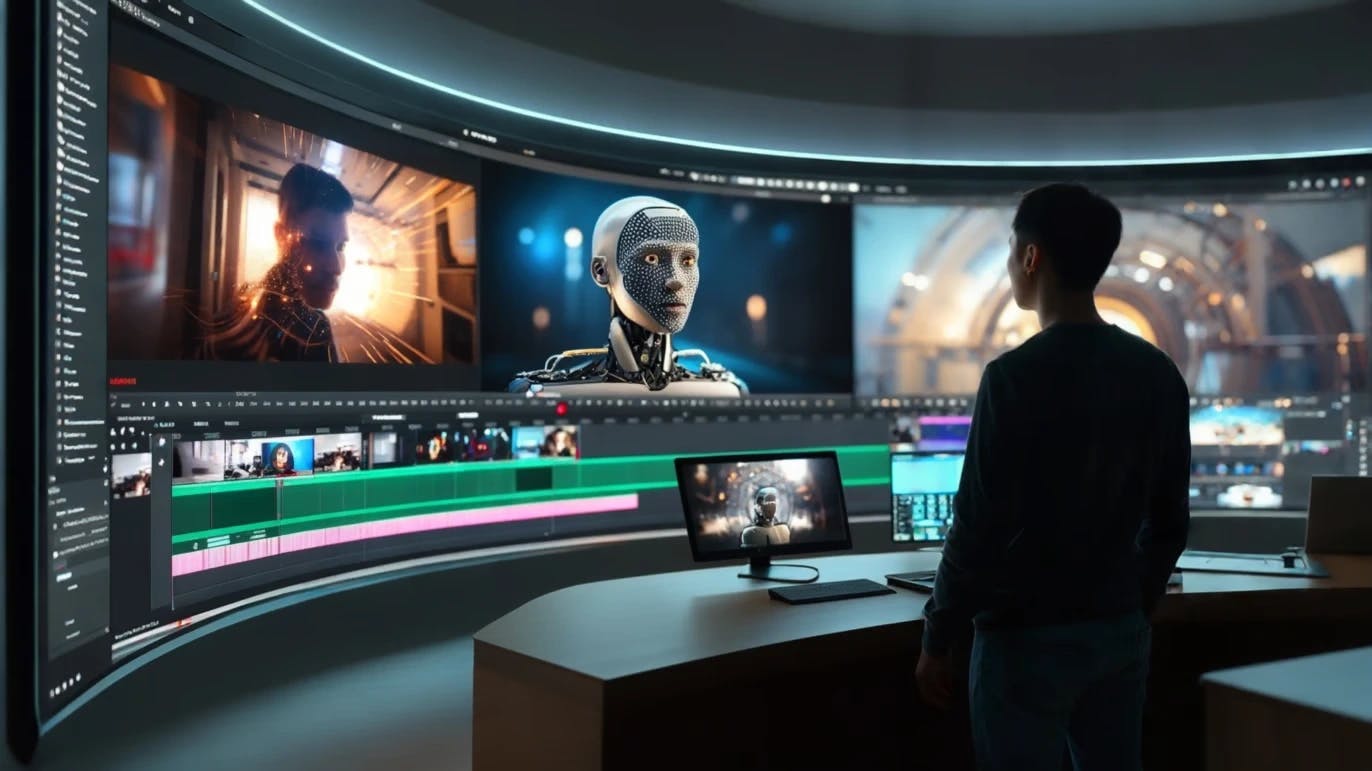
How AI-Powered Video Editing Tools Are Revolutionizing Video Translation and Localization
Know more
Top Vulnerabilities in MCP Servers & How FinTechs Can Protect Themselves
Know more
